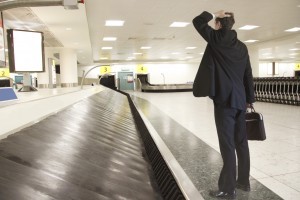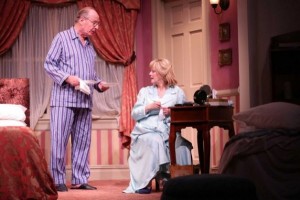 “Dangers by being despised grow great; so they do by absurd provision against them.”
“Dangers by being despised grow great; so they do by absurd provision against them.”
Edmund Burke, speech on the Petition of the Unitarians, 1792.
Terry Teachout on the arts in New York City
My own hand, alas, is not so easy or rewarding. I’m left-handed, with an ink-smudging overhand hook so exaggerated that my first-grade teacher, who in 1962 was already a thoroughly cranky old woman, tried briefly and vainly to get me to write with my right hand. I’ve found penmanship awkward ever since, which is why I learned to type as a boy and why I took so readily to e-mail as a grownup. Yet my correspondent was right: convenient though e-mail is, there’s something uncanny about receiving a handwritten letter, and no less uncanny about sending one….
Read the whole thing here.
 “When you visualized a man or woman carefully, you could always begin to feel pity—that was a quality God’s image carried with it. When you saw the lines at the corners of the eyes, the shape of the mouth, how the hair grew, it was impossible to hate. Hate was just a failure of imagination.”
“When you visualized a man or woman carefully, you could always begin to feel pity—that was a quality God’s image carried with it. When you saw the lines at the corners of the eyes, the shape of the mouth, how the hair grew, it was impossible to hate. Hate was just a failure of imagination.”
Graham Greene, The Power and the Glory
WEDNESDAY, AUGUST 12 Sometimes my theater-related trips resemble paid vacations with a little work thrown in. Other times, irrespective of the quality of the shows that I see, they’re just another day at the office, minus the reassuring comforts of home. That, I regret to say, was how I felt about my four-night stay in Ashland, where I saw three shows at the Oregon Shakespeare Festival.
 Don’t get me wrong—I like Ashland very much. The problem, as I discovered two years ago, is that I don’t especially enjoy going there by myself. Had Mrs. T accompanied me to Oregon, I doubtless would have eaten better meals and spent much more time strolling through town. Instead I mostly stuck to my hotel room, knocking out three Wall Street Journal columns and a Commentary essay about Al Hirschfeld while the summer sun shone brightly through the window. It felt as though the teacher had made me stay inside during recess. I emerged only to go to the theater, take my meals, and soak twice daily in the outdoor whirlpool.
Don’t get me wrong—I like Ashland very much. The problem, as I discovered two years ago, is that I don’t especially enjoy going there by myself. Had Mrs. T accompanied me to Oregon, I doubtless would have eaten better meals and spent much more time strolling through town. Instead I mostly stuck to my hotel room, knocking out three Wall Street Journal columns and a Commentary essay about Al Hirschfeld while the summer sun shone brightly through the window. It felt as though the teacher had made me stay inside during recess. I emerged only to go to the theater, take my meals, and soak twice daily in the outdoor whirlpool.
It didn’t help that I was, as usual, moderately disoriented by the change in time zones. In addition, I find it hard to write in hotel rooms, perhaps because staying in a hotel makes me feel as though I ought to be relaxing, not working.
 Mostly, though, I was demoralized by Mrs. T’s absence, enough so that I was reduced to breakfasting at the hotel, a sure sign of trouble on the horizon. (What is so depressing as the scrambled eggs served at a “complimentary expanded continental breakfast”?) As a result of all this, my overall mood, relieved only by the shows I saw, was grumpy and disagreeable. It was as if the previous day’s blissful drive through the Willamette National Forest had never happened.
Mostly, though, I was demoralized by Mrs. T’s absence, enough so that I was reduced to breakfasting at the hotel, a sure sign of trouble on the horizon. (What is so depressing as the scrambled eggs served at a “complimentary expanded continental breakfast”?) As a result of all this, my overall mood, relieved only by the shows I saw, was grumpy and disagreeable. It was as if the previous day’s blissful drive through the Willamette National Forest had never happened.
SATURDAY, AUGUST 15 I drove from Ashland to Portland without stopping for anything other than gas, dropped off my rental car, and checked into a comfortable but nondescript airport hotel with a first-class whirlpool. As much as I like Portland, which has an excellent art museum (Clement Greenberg’s personal art collection is housed there, though you’d never guess it from the museum’s website) and terrific restaurants, I knew I wasn’t good for anything more than a quick dinner, a long soak, and an early bedtime. All I wanted was to be home.
SUNDAY, AUGUST 16 The horror! The horror!
It started when my flight from Portland arrived early at JFK, then waited an hour on the tarmac for a gate. Once we finally got off the plane, it took me nearly a half-hour to walk from there to the luggage carousels. (Kennedy is a very big airport.) I spent an additional half-hour waiting patiently for my suitcase, which contained all of my clothes, then went to the Delta baggage office, where I was politely informed that it had never been loaded on the plane in Portland and would probably arrive in New York the following day. By then my fellow passengers were starting to suspect the worst, with good reason: it turned out that most of their bags had been left behind.
 Not wanting to stick around for the resulting riot, I boarded Kennedy’s “AirTrain” (arrgh!) for the car rental center, picked up a rental car, and drove straight into bumper-to-bumper late-night traffic. The agonizing slowness of my progress temporarily disguised the fact that Enterprise had stuck me with a lemon, a brand-new sedan whose transmission was misbehaving and which, I found out the following day, had already been recalled to the factory. I arrived in Connecticut, unfed and unwatered, at one-thirty in the morning, and fell into bed.
Not wanting to stick around for the resulting riot, I boarded Kennedy’s “AirTrain” (arrgh!) for the car rental center, picked up a rental car, and drove straight into bumper-to-bumper late-night traffic. The agonizing slowness of my progress temporarily disguised the fact that Enterprise had stuck me with a lemon, a brand-new sedan whose transmission was misbehaving and which, I found out the following day, had already been recalled to the factory. I arrived in Connecticut, unfed and unwatered, at one-thirty in the morning, and fell into bed.
MONDAY, AUGUST 17 I went to a nearby Enterprise office to swap my lemon for a car that worked, then started tracking the travels of my miscreant suitcase. It reached New York in the afternoon and was sent from there to Detroit, from whence it was flown to Hartford an hour too late to be delivered to our place in Connecticut that same night. Since Mrs. T and I planned to drive to New York at noon on Tuesday, I decided to play it safe and pick the bag up at the airport first thing in the morning.
TUESDAY, AUGUST 18 I left the house at eight-fifteen and arrived at the Hartford airport at nine, only to find that the Delta baggage office, which was supposed to open at nine, was still shut tight. I could see my bag through the window and briefly considered breaking the glass and retrieving it, but then I recovered my senses and sat down to wait.
No one having showed up by nine-thirty, I raised a ruckus, after which somebody from Delta arrived at nine-forty-five to unlock the office and give me my bag, whose retractable handle had been broken somewhere between Portland and Hartford and could no longer be used. The baggage agent politely informed me that Delta doesn’t pay for broken retractable handles. I said something short and sharp, opened the bag to make sure that nothing was missing, and stalked out of the office.
(Third of four parts)
* * *
The Bill Charlap Trio plays Leonard Bernstein’s “Lonely Town” (from On the Town). Peter Washington is the bassist, Kenny Washington the drummer:
A 1970 commercial for American Tourister luggage:
 “I make it a practice to avoid hating anyone. If someone’s been guilty of despicable actions, especially toward me, I try to forget him. I used to follow a practice—somewhat contrived, I admit—to write the man’s name on a piece of scrap paper, drop it into the lowest drawer of my desk, and say to myself: ‘That finishes the incident, and so far as I’m concerned, that fellow.’ The drawer became over the years a sort of private wastebasket for crumbled-up spite and discarded personalities.”
“I make it a practice to avoid hating anyone. If someone’s been guilty of despicable actions, especially toward me, I try to forget him. I used to follow a practice—somewhat contrived, I admit—to write the man’s name on a piece of scrap paper, drop it into the lowest drawer of my desk, and say to myself: ‘That finishes the incident, and so far as I’m concerned, that fellow.’ The drawer became over the years a sort of private wastebasket for crumbled-up spite and discarded personalities.”
Dwight Eisenhower, At Ease: Stories I Tell to Friends
In today’s Wall Street Journal I review a Connecticut revival of Alan Ayckbourn’s Bedroom Farce and the New York premiere of A.J. Gurney’s Love & Money. Here’s an excerpt.
* * *
Alan Ayckbourn is the reigning master of the sad comedy, in which a dash of bitters adds unexpected depth to the onstage hijinks. As funny as they seem (and are) at first glance, such Ayckbourn plays as “Absurd Person Singular,” “The Norman Conquests” and “Time of My Life” cut to the dramatic quick as ruthlessly and poignantly as anything that Chekhov ever wrote. From time to time, though, Mr. Ayckbourn chooses to play his farces of marital misunderstanding straight down the middle, with results that give unfailing pleasure to those in search of nothing more than a good laugh. “Bedroom Farce,” one of his rare Broadway successes, is such a show, and Westport Country Playhouse, which has staged five of his plays in the past decade, is giving it a handsomely cast, precision-tooled revival directed by John Tillinger, a famously expert farceur, that makes the most of every twist in the plot.
 Mr. Ayckbourn loves his scenic gimmicks, and “Bedroom Farce,” first performed in 1975, features one of the simplest and best: The set consists of three separate bedrooms. The first one belongs to Ernest and Delia (Paxton Whitehead and Cecilia Hart), the middle-aged parents of Trevor (Carson Elrod), a flighty fellow whose marriage to the neurotically self-conscious Susannah (Sarah Manton) is headed for the rocks. Bedroom No. 2 belongs to the newly married Malcolm and Kate (Scott Drummond and Claire Karpen), who are throwing a housewarming party. In addition to Trevor, Susannah, Malcolm and Kate, the guests include Nick and Jan (Matthew Greer and Nicole Lowrance), the occupants of Bedroom No. 3. Nick, alas, has thrown his back out and is confined to bed. Too bad for him, since Jan used to be Trevor’s girlfriend and is still susceptible—up to a point—to his charms.
Mr. Ayckbourn loves his scenic gimmicks, and “Bedroom Farce,” first performed in 1975, features one of the simplest and best: The set consists of three separate bedrooms. The first one belongs to Ernest and Delia (Paxton Whitehead and Cecilia Hart), the middle-aged parents of Trevor (Carson Elrod), a flighty fellow whose marriage to the neurotically self-conscious Susannah (Sarah Manton) is headed for the rocks. Bedroom No. 2 belongs to the newly married Malcolm and Kate (Scott Drummond and Claire Karpen), who are throwing a housewarming party. In addition to Trevor, Susannah, Malcolm and Kate, the guests include Nick and Jan (Matthew Greer and Nicole Lowrance), the occupants of Bedroom No. 3. Nick, alas, has thrown his back out and is confined to bed. Too bad for him, since Jan used to be Trevor’s girlfriend and is still susceptible—up to a point—to his charms.
You can probably guess some of what happens next, but Mr. Ayckbourn, as always, keeps the fast balls flying…
When he’s good, nobody’s better than A.R. Gurney, the author of “Love Letters” and “Sylvia” (which will have its long-overdue Broadway premiere in October) and a peerless chronicler of the protracted decline of America’s WASP ruling class. But he is, like many other similarly prolific artists, an in-and-out runner whose work varies widely in quality. Unlike its predecessor, the outstanding “Family Furniture,” “Love & Money,” Mr. Gurney’s 48th play, is light and slight, more like an extended comic sketch (an hour and 15 minutes) than a full-fledged show. As is often the case with his lesser efforts, it’s also over-explicit in its treatment of one of his preferred themes, the devastating effects of money on the souls of those who inherit it.
Cornelia Cunningham (Maureen Anderman), the principal character, is an upper-crust New Yorker who in old age finds herself beset with an inflamed case of liberal guilt which she is endeavoring to assuage by giving away all her worldly goods. Nothing surprising comes of her open-handedness, but Mr. Gurney rings his changes with smooth skill, squeezing solid chuckles out of Cornelia’s plight….
* * *
To read my review of Bedroom Farce, go here.
To read my review of Love & Money, go here.
The trailer for Bedroom Farce:
 Jacques d’Amboise and Melissa Hayden dance George Balanchine’s Tchaikovsky Pas de Deux on an episode of Voice of Firestone telecast in 1962. The music, originally written by Tchaikovsky for inclusion in Swan Lake, was subsequently dropped from the score and not rediscovered until 1953. Balanchine choreographed it in 1960:
Jacques d’Amboise and Melissa Hayden dance George Balanchine’s Tchaikovsky Pas de Deux on an episode of Voice of Firestone telecast in 1962. The music, originally written by Tchaikovsky for inclusion in Swan Lake, was subsequently dropped from the score and not rediscovered until 1953. Balanchine choreographed it in 1960:
(This is the latest in a series of arts-related videos that appear in this space each Monday, Wednesday, and Friday.)
| M | T | W | T | F | S | S |
|---|---|---|---|---|---|---|
| 1 | 2 | 3 | ||||
| 4 | 5 | 6 | 7 | 8 | 9 | 10 |
| 11 | 12 | 13 | 14 | 15 | 16 | 17 |
| 18 | 19 | 20 | 21 | 22 | 23 | 24 |
| 25 | 26 | 27 | 28 | 29 | 30 | |
An ArtsJournal Blog